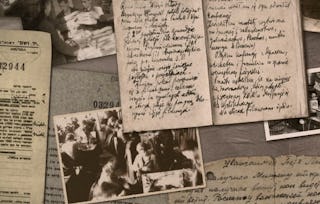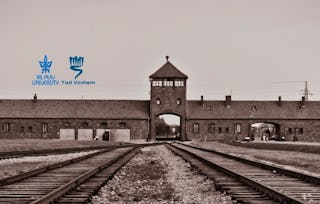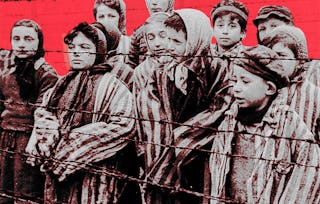The Holocaust - what do we know about it and what more can we learn? This course provides a broad and in-depth look at central topics relating to the history of the Holocaust. It examines the events and processes that took place during these earth-shattering years through new and thought-provoking perspectives.

Chosen Issues in Holocaust History
29 reviews
Recommended experience
What you'll learn
The rise of Nazi party to power and the development of anti-Jewish policy until the outbreak of the war
The establishment of the ghettos and the daily life within them
The development and implementation of the "Final Solution"
The development of antisemitism throughout the ages and its expressions
Skills you'll gain
Details to know
See how employees at top companies are mastering in-demand skills

There are 6 modules in this course
In this chapter, the first of the course, we will learn together with Professor Guy Meron about Nazi Germany between 1933-1939. The chapter begins with an overview of the state of European Jewry during the interwar years. It will explore the fall of the Weimar Republic and the rise of the Nazi regime to power, as well as the implementation of anti-Jewish policies until the outbreak of World War II in 1939.
What's included
13 videos9 readings5 discussion prompts
Under the direction of Professor Dan Michman, this chapter will focus on Nazi Germany's anti-Jewish policies, from the outbreak of the war until 1941. We will identify different regime patterns in countries under German occupation and their anti-Jewish policies. We will also learn about the so-called "Jewish Council" (Judenrat), the establishment of ghettos and the lives of Jews within and outside of them during the Holocaust.
What's included
12 videos6 readings4 discussion prompts
Together with Dr David Silberklang, in this chapter, we will discuss the formulation and implementation of the "Final Solution". Dr Silberklang will explain different historiographical approaches to the development of the "Final Solution", will discuss Germany's invasion of the Soviet Union and the beginning of the mass murders. We will also explore the establishment of the death camps, as well as the life of prisoners in the various camps.
What's included
14 videos4 readings6 discussion prompts
In this chapter, Dr Robert Rosett will describe the development of antisemitism throughout the ages and the evolution of the image of the Jewish figure within it. We will explore modern, political and racial antisemitism in the 19th century, as well as Nazi ideology.
What's included
8 videos8 readings4 discussion prompts
Two main subjects are raised in Dr Joel Zisenwine lectures found in this chapter: The key stages in the history of world war II and the deportation of Jews to camps during the Holocaust.
What's included
12 videos3 readings8 discussion prompts
The issues discussed in this chapter are taken from Yad Vashem's learning center "Reflections After the Holocaust" , situated in the museum complex. The speakers include historian Prof. Omar Bartov, author David Grossman and Father Emile Shoufani and Holocaust survivor and journalist Roman Frister. The chapter consists of three sub-chapters, each containing one video lecture. Alongside them, you will find testimonies, original documents, discussion prompts, and primary and secondary sources.
What's included
4 videos2 readings3 discussion prompts
Instructor

Offered by
Explore more from History
 Status: Free
Status: Free Status: Free
Status: Free Status: Free
Status: FreeTel Aviv University
 Status: Preview
Status: PreviewUniversity of California, Santa Cruz
Why people choose Coursera for their career

Felipe M.

Jennifer J.

Larry W.

Chaitanya A.
Learner reviews
- 5 stars
68.96%
- 4 stars
24.13%
- 3 stars
3.44%
- 2 stars
0%
- 1 star
3.44%
Showing 3 of 29
Reviewed on Aug 5, 2021
THANK YOU to all instructors, Coursera, and all involved in making this valuable course available. Rick

Open new doors with Coursera Plus
Unlimited access to 10,000+ world-class courses, hands-on projects, and job-ready certificate programs - all included in your subscription
Advance your career with an online degree
Earn a degree from world-class universities - 100% online
Join over 3,400 global companies that choose Coursera for Business
Upskill your employees to excel in the digital economy
Frequently asked questions
To access the course materials, assignments and to earn a Certificate, you will need to purchase the Certificate experience when you enroll in a course. You can try a Free Trial instead, or apply for Financial Aid. The course may offer 'Full Course, No Certificate' instead. This option lets you see all course materials, submit required assessments, and get a final grade. This also means that you will not be able to purchase a Certificate experience.
More questions
Financial aid available,

